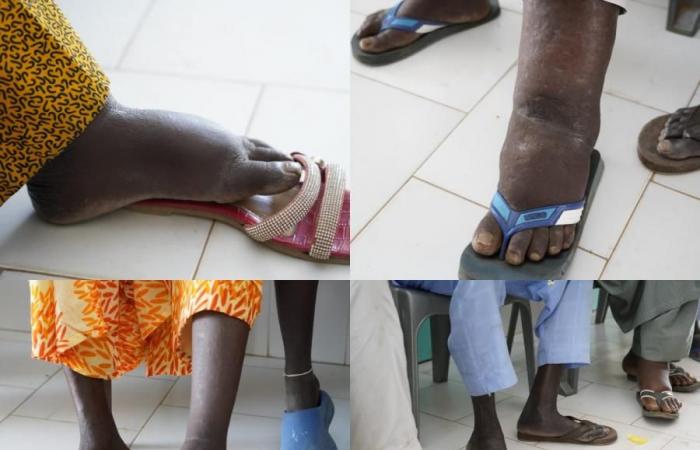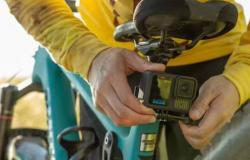Seven kilometers from Khombole, the villages of Ndingler and Ndouff embody the harsh reality of neglected tropical diseases (NTDs). These diseases, which mainly affect the poorest communities in tropical areas, are caused by pathogens such as parasites, bacteria, viruses or fungi. Their transmission is often linked to specific environmental conditions, such as water stagnation or the presence of animal reservoirs. In Khombole, these diseases are omnipresent, profoundly affecting the lives of residents.
Mamadou Thiaw, a man in his sixties, has endured the torments of elephantiasis, a form of lymphedema, for five years. This disease, caused by parasites, causes disproportionate swelling of the limbs, as evidenced by his left foot, which has become the symbol of his ordeal. “I feel unbearable pain, which often deprives me of sleep. I no longer have the strength to work, much less to hope,” he confides. Lymphedema, linked to blockages in the lymphatic system, distorts and prevents the body from functioning properly.
Mamadou is not an isolated case. In Khombole and surrounding villages, NTDs appear in various forms: lymphedema, hydroceles (swelling of the bursae in men) and bilharzia (parasitic infection mainly affecting the internal organs). According to the head nurse, Ndèye Sokhna Boye, these pathologies, devastating both physically and psychologically, mainly affect the elderly. Like Saliou Faye, 70 years old, who has been trying for a decade to relieve her pain through traditional medicine, or Soukeyna Ly, 75 years old, whose fight was exhausted after years of unsuccessful consultations.
At 30 years old, Khoudia Sarr also bears the burden of NTDs. Affected since the age of 22, she saw her life turned upside down. “They told me it was bad luck. It was only after consulting at the health post that I received hygiene kits and medicines. But my life is no longer the same,” she explains, resigned. His small business is no longer enough to meet the needs of his household. She implores the authorities to intensify efforts to combat these diseases.
The National Program for the Fight against Neglected Tropical Diseases (PNLMTN) launched an action plan three months ago to reverse the trend. According to Dr Safiétou Aidara, deputy chief medical officer of the Khombole health district, an awareness campaign made it possible to identify 81 cases. “These cases include 43 lower limb lymphedemas, 35 hydroceles and other rarer forms, such as breast lymphedema,” she explains.
Community relays, trained and integrated into this process, play a crucial role. “They live with patients on a daily basis, which facilitates awareness-raising and case monitoring,” explains Khady Ndiaye, MTN focal point in Khombole. However, she regrets the reluctance of certain patients, particularly men suffering from hydrocele. “These pathologies being intimate, patients often refuse to consult, even when a partner alerts them. »
Despite the efforts, the challenges remain colossal. The lack of community relays, limited resources and insufficient infrastructure complicate case management. Xavier Ndione, supervisor of primary health care, also highlights the environmental impact, particularly abandoned quarries where contaminated water stagnates. “These temporary ponds are hotbeds of transmission, especially for diseases like bilharzia,” he explains.
Speak Up Africa, in partnership with the Coalition of Civil Society Organizations Fighting NTDs and the National NTD Control Program, provides essential support in advocacy, awareness raising and medical supplies. These initiatives, although appreciated by the populations, are not enough to cover all needs.
Dr Aidara calls for strong mobilization to help patients. “NTDs must no longer be relegated to the background. These diseases destroy lives and hinder development. We need global support to reduce their impact. »
With a population of 20,321 inhabitants and 21 health posts, the Khombole health district is fighting to contain these scourges. In January, a massive drug distribution campaign is planned for children under 5 years old. But, as Dr Aidara points out, hope rests as much on concrete actions as on the collective desire to restore dignity and health to these forgotten populations.






